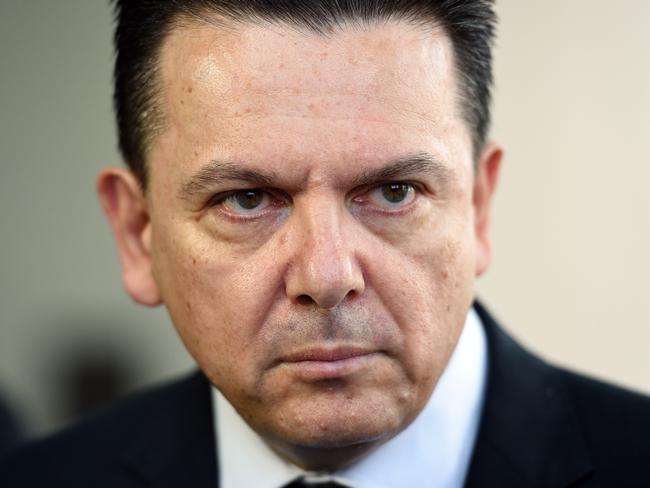Xenophon parlays ABCC bill for his own increased authority and helps Turnbull
THE PM has had an end-of-year win — and it’s all thanks to a man who’s shaping up to be the country’s most powerful politician.
ANALYSIS
KING Nick, the most effective politician in Parliament, has made Malcolm Turnbull’s day and reinforced his own authority in home state South Australia.
He has moved rivers and billions of dollars in procurement policy, not to mention the dispersal of responsibilities within the government.
Senator Xenophon, who heads the Nick Xenophon Team of three senators and one MP, has delivered the Australian Building and Construction Commission legislation the Prime Minister sorely needs for a government end-of-year victory celebration.
The bill passed the Senate this morning, 36 votes to 33.
The final legislation only bears a passing resemblance to the original proposition taken to the double-dissolution election, like a fading beauty who needed substantial cosmetic surgery to remain alluring.
However, the central objective of the legislation — to put building site rough-house and disruption outside the law — remains intact and that is what the government will light up on its “things achieved” marquee.

The government has not been able to negotiate all its legislative traffic through the Senate. Proposed changes to paid parental leave and its plan to cut corporate tax by $50 billion over 10 years have been put off until next year.
It did get the other double-dissolution legislation, the registered organisations bill, into law.
But there is no sign of legislation to permanently ban refugees kept on Manus and Nauru islands from ever visiting Australia, even as citizens of a third country.
Mr Turnbull needed to establish that, after an election which reduced him to a one-seat majority, he could run government and manage the Parliament.
The slightly dented trophies of the ABCC and the registered organisations successes will achieve that.
And as a senior Liberal stingingly noted: “The ABCC is something Tony Abbott and Eric Abetz couldn’t do.”
The changes are the add-ons demanded by the crossbench for the votes needed to counter Labor and the Greens.
They include the strange demand from Liberal Democrat David Leyonhjelm for consumers to be allowed into every second ABC and SBS board meetings to question directors.
The changes are evidence the crossbench senators are not wholly committed to the ABCC. They see it more as a vehicle for their own influence and pet projects. Senator Leyonhjelm once tried to leverage his support for it to get a new shotgun.

The Turnbull Government is not the first to be put at the mercy of a small clutch of senators and won’t be the last.
It was in a political bind. Voters are likely to simply note that promised legislation has been passed, whereas failure would have seen them mark down the government as being impotent.
This is the price paid for the end-of-year bragging rights:
â— Senator Xenophon won a prime ministerial pledge to fight for an extra 450 gigalitres in environmental water flows from the Murray River to South Australia. This process saw Deputy Prime Minister Barnaby Joyce, who has titular control of water policy, forced to take a step back
â— From March, government projects worth more than $4 million will have to show preference for local suppliers, sources and labour and ensure materials meet local standards. This could see preference for local steel over imported products. But it also will be seen as a form of protectionism that could affect our free trade agreements
â— Senator Leyonhjelm has won changes to onus of proof provisions, which originally meant a suspect had to prove innocence, rather than his accusers having to prove guilt
â— Derryn Hinch supported changes to protect subcontractors.



